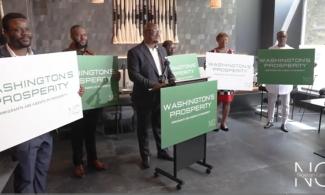In celebration of Black Business Month, the Nigerian Centre has launched the Washington’s Prosperity Campaign — a bold initiative to highlight the economic and cultural impact of Nigerian-American entrepreneurs and reframe immigration as a driver of prosperity in the Washington metropolitan region.
The campaign draws a meaningful connection between the legacy of Black business ownership and the evolving contributions of African immigrants, particularly Nigerians, who continue to shape the economic landscape of the U.S. capital.
“Washington’s Prosperity is about returning to our core values — and prosperity is chief among them,” said Gbenga Ogunjimi, Executive Director of the Nigerian Centre. “This campaign serves as a visual and narrative reminder that immigrants are not just part of the city’s story — they are writing it.”
Faces of Prosperity Across the Capital
The campaign features five Nigerian-American entrepreneurs whose stories are now showcased across metro stations, buses, and public transit throughout the DC area. The goal: to affirm immigrant-led innovation and inspire public support for inclusive policies and economic participation.
Among the spotlighted voices:
-
Dr. Gina Page, co-founder of African Ancestry, shared her personal tie to the campaign, noting her Fulani heritage and the role her business plays in reconnecting the African diaspora with their roots.
-
Tony Ijaodola, owner of The Continent DC restaurant near the White House, emphasized the campaign’s cultural relevance: “When people enter our space, we want them to feel the spirit of Africa as a whole—not just Nigeria.”
-
Ifeoma C. Onyia, the first African immigrant to open a U.S. winery, drew attention to representation gaps in the industry: “Out of 11,000 wineries, less than 1% are minority-owned. That must change.”
-
Eze Okwodu, a realtor and mentor, shared how the absence of guidance delayed his own journey: “It took me seven years to buy my first property. Now, I’m teaching others so they don’t face the same obstacles.”
-
Ayomide Ibrahim, CEO of FinServe Pro, stressed the need for immigrants to take charge of their own stories: “If we don’t define who we are, others will do it for us — and not always truthfully.”
A Broader Push for Visibility and Policy Change
Supported by advocacy groups such as African Communities Together and the National Partnership for New Americans, the campaign comes at a pivotal time for immigration discourse. Policymakers are increasingly seeking data-backed narratives around immigrants’ roles in local economies.
According to the DC Fiscal Policy Institute, Nigerian Americans have established themselves as leading voices in healthcare, education, finance, and tech. The Nigerian Centre hopes the campaign will encourage support for immigrant-owned businesses, foster inclusive policies, and reinforce the importance of community-backed development.

